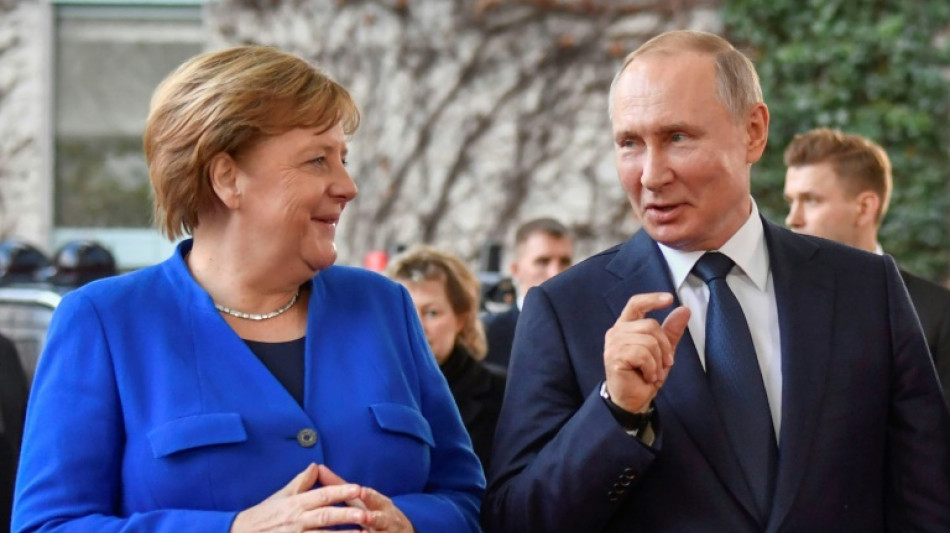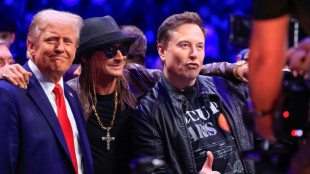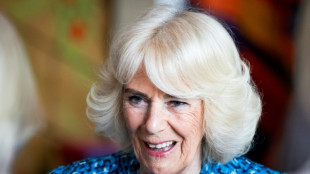
-
 South Korea president clings to power after martial law U-turn
South Korea president clings to power after martial law U-turn
-
Presidential vote seen as referendum on Romania's European future

-
 Hamilton bids farewell to Mercedes as Ferrari vie for title
Hamilton bids farewell to Mercedes as Ferrari vie for title
-
New Zealand unchanged in bid to hit back against England

-
 Macron seeks remedy to France's political crisis
Macron seeks remedy to France's political crisis
-
New Natalia Lafourcade album celebrates music's onstage evolutions

-
 Taiwan's Lai kicks off visit to US territory Guam
Taiwan's Lai kicks off visit to US territory Guam
-
Ivory Coast staple cassava meal gains UNESCO heritage status

-
 OpenAI to partner with military defense tech company
OpenAI to partner with military defense tech company
-
Liverpool held but Slot salutes 'special' Salah

-
 Man City needed to break losing 'routine', says Guardiola
Man City needed to break losing 'routine', says Guardiola
-
Leipzig down Frankfurt to reach German Cup quarters, Cologne strike late

-
 Mbappe admits penalty miss 'big mistake' as Bilbao beat Real Madrid
Mbappe admits penalty miss 'big mistake' as Bilbao beat Real Madrid
-
'Sad, disappointed' Mbappe pays penalty as Bilbao beat Real Madrid

-
 US stocks surge to records, shrugging off upheaval in South Korea, France
US stocks surge to records, shrugging off upheaval in South Korea, France
-
Liverpool held in Newcastle thriller, Arsenal inflict Amorim's first defeat

-
 Shiffrin confirms she'll miss Beaver Creek World Cup races
Shiffrin confirms she'll miss Beaver Creek World Cup races
-
Corner kings Arsenal beat Man Utd to close gap on Liverpool

-
 Mbappe pays penalty as Bilbao beat Real Madrid
Mbappe pays penalty as Bilbao beat Real Madrid
-
NFL Jaguars place Lawrence on injured reserve with concussion

-
 North Korea, Russia defence treaty comes into force
North Korea, Russia defence treaty comes into force
-
Openda hits brace as Leipzig beat Frankfurt in German Cup last 16

-
 Schar punishes Kelleher blunder as Newcastle hold Liverpool in thriller
Schar punishes Kelleher blunder as Newcastle hold Liverpool in thriller
-
De Bruyne masterclass helps Man City end seven-game winless streak

-
 Syrian rebels surround Hama 'from three sides', monitor says
Syrian rebels surround Hama 'from three sides', monitor says
-
Lawyers seek leniency for France rape trial defendants, blaming 'wolf' husband

-
 OpenAI chief 'believes' Musk will not abuse government power
OpenAI chief 'believes' Musk will not abuse government power
-
Thousands rally in Georgia after police raid opposition offices

-
 S. Korea opposition push to impeach president
S. Korea opposition push to impeach president
-
Powell 'not concerned' US Fed would lose independence under Trump

-
 French government falls in historic no-confidence vote
French government falls in historic no-confidence vote
-
Syrian White Helmets chief 'dreams' of never pulling a body out of rubble again

-
 NBA Suns lose Durant for at least a week with ankle injury
NBA Suns lose Durant for at least a week with ankle injury
-
Warhammer maker Games Workshop enters London's top stocks index

-
 Iran Nobel winner released for three weeks, 'unconditional' freedom urged
Iran Nobel winner released for three weeks, 'unconditional' freedom urged
-
Red Cross marks record numbers of humanitarians killed in 2024

-
 Johnson's Grand Slam 'no threat', says World Athletics boss Coe
Johnson's Grand Slam 'no threat', says World Athletics boss Coe
-
Qatar's emir and UK's Starmer talk trade as state visit ends

-
 Cuba suffers third nationwide blackout in two months
Cuba suffers third nationwide blackout in two months
-
Russia, Ukraine to send top diplomats to OSCE summit in Malta

-
 Spanish royals to attend memorial service for flood victims
Spanish royals to attend memorial service for flood victims
-
LPGA, USGA new policy requires female at birth or pre-puberty change

-
 Stick to current climate change laws, US tells top UN court
Stick to current climate change laws, US tells top UN court
-
British Museum chief says Marbles deal with Greece 'some distance' away

-
 Pope Francis receives electric popemobile from Mercedes
Pope Francis receives electric popemobile from Mercedes
-
Gaza civil defence: thousands flee Israeli strikes, evacuation calls

-
 Trump names billionaire private astronaut as next NASA chief
Trump names billionaire private astronaut as next NASA chief
-
Pidcock to leave INEOS Grenadiers at end of season

-
 Seoul stocks weaken, Paris advances despite political turmoil
Seoul stocks weaken, Paris advances despite political turmoil
-
South America summit hopes to seal 'historic' trade deal with EU


Clouds over Merkel's legacy as Russian invasion lays flaws bare
Up to the final hours before Russia began its invasion of Ukraine, former chancellor Angela Merkel had been touted as the person favoured by Germans to try to talk President Vladimir Putin out of the conflict.
But as Russian bombs fell on Ukrainian cities, a shadow has fallen on Merkel's 16 years in office, with some observers now questioning if her detente policies with Putin had in fact left Germany, and Europe, vulnerable.
Once hailed as the leader of the free world, the veteran centre-right leader has been accused by some of increasing Europe's reliance on Russian energy and neglecting Germany's defence in what appeared to be a devastating miscalculation of Putin's ambitions.
Merkel's push for diplomacy and bids to bind regimes to treaties and business contracts now look like "an error", conservative daily Die Welt, long critical of Merkel, charged.
"What Germany and Europe has experienced over the last days is nothing short of a reversal of Merkel's policies of guaranteeing peace and freedom through treaties with despots," it wrote.
Over the last decade, Germany's energy reliance on Russia rose from 36 percent of its total gas imports in 2014 to 55 percent currently, with the deal for the controversial Nord Stream 2 signed after the Kremlin's annexation of Crimea from Ukraine.
That has left Germany nearly helpless to follow allies like the United States and impose an oil and gas embargo against Russia.
And Germany's defence profile had been blunted by successive years of under-investment. That has drawn the ire of the United States and allies which have repeatedly pressed Europe's biggest economy to meet the NATO defence spending target of 2 percent of national output.
One of Merkel's closest aides and former defence minister, Annegret Kramp-Karrenbauer, has condemned Germany's "historical failure" to bolster its military over the years.
"After Georgia, Crimea, and Donbas, we have not prepared anything that would have really deterred Putin," she tweeted, referring to incursions carried out by Russia while Merkel was in power.
- 'Terrible mistake' -
Merkel took power in 2005 after beating Social Democrat Gerhard Schroeder at the polls.
Schroeder himself has been pilloried for his friendship with Putin, and his refusal to quit key posts at Russian energy giants Rosneft and Gazprom.
But her critics say that while Schroeder had started the ball rolling on Nord Stream 1, a pipeline funnelling Russian gas to Germany, Merkel signed off on Nord Stream 2.
The controversial 10-billion-euro ($11-billion) pipeline is disputed because it bypasses Ukraine, depriving Kyiv of gas transit fees. It has been put on ice in the wake of the invasion.
Merkel "must take her share of the blame with her eagerness to seek close economic ties to Russia" as it led to Germany's dependency on Russian energy, Sueddeutsche daily concluded.
"We are now seeing the consequences of that terrible mistake," it said.
On the geopolitical front, her government's reluctance in admitting Georgia and Ukraine to the NATO fold in 2008 -- despite a push by Washington -- was now also under scrutiny.
- 'Limits' -
Joerg Forbrig, director for central and eastern Europe at the German Marshall Fund, rejected the notion that Merkel may have been too naive about the Kremlin boss.
"She had a pretty good appreciation of who Vladimir Putin is and what Russia is today," he said.
But she had made her decisions in the face of pressure from her coalition partners during 12 out of 16 years -- the Social Democrats -- who favoured closeness with Russia, he said.
A business lobby that sought economic ties with Russia and Germany's need to find alternative energy sources as it wound down nuclear power plants were also part of the considerations.
"All these cross pressures didn't really allow her to implement a Russia policy that would have been commensurate with the problem that Russia is," said Forbrig.
Marina Henke, professor of international relations at the Hertie School, said keeping her coalition together had been crucial for Merkel, "a bridge-builder" not known for lofty visions but who favoured step-by-step progress.
"She was much more thinking about... how can I make things better in the next one, two years," said Henke.
While the analysts noted that she made a clear mistake over energy, they believe that the Russia question would not lead to a rewrite of her overall political legacy, and that she would still be credited for steering Germany through a multitude of crises and for keeping the EU together.
For Henke this is because the responsibility of the SPD far outweighs Merkel's in Germany's past stance towards Russia.
"If you don't know Germany, and think that the chancellor or the head of state is omnipotent, then it might come across like (Merkel's to blame). But if you're German... then you know... it's basically a major mistake of the SPD."
Forbrig pointed to a meeting when Merkel told Belarusian opposition leader Svetlana Tikhanovskaya "not to overestimate" how much she could help because the leeway she is working with is "much more limited than many people think".
"She had an acute understanding of the limits of her power," he said.
J.Bergmann--BTB


